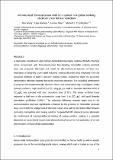| dc.contributor.author | Kanhere, Elgar | |
| dc.contributor.author | Wang, Nan | |
| dc.contributor.author | Miao, Jianmin | |
| dc.contributor.author | Triantafyllou, Michael S | |
| dc.date.accessioned | 2017-07-12T17:45:26Z | |
| dc.date.available | 2017-07-12T17:45:26Z | |
| dc.date.issued | 2016-04 | |
| dc.date.submitted | 2016-03 | |
| dc.identifier.issn | 09254005 | |
| dc.identifier.uri | http://hdl.handle.net/1721.1/110684 | |
| dc.description.abstract | A disposable, miniaturized and compact microelectromechanical systems (MEMS) chemical sensor incorporated with three-dimensional, free-standing micropillar working electrode array was proposed, fabricated and tested for electrochemical detection of lead ions. Inspiration of designing arch-shaped columnar sensing electrode array originated from the biological imitation of shark’s olfactory sensing system, considering shark has developed ultrasensitive olfactory capacity during the evolutionary processes. The analytical performance of proposed bio-inspired MEMS chemical sensor was comprehensively investigated. Under optimal conditions, high sensitivity of 32 nA/(μg/L) as well as favorable detection limit of 0.2 μg/L was achieved with short deposition time of 30 s. The sensor exhibited linear responses to lead ions in the concentration range from 1 to 130 μg/L with good linearity (correlation coefficient: 0.9994). The collection efficiency towards target ions in the preconcentration step was significantly enhanced by the presence of micropillar electrode array, due to both the enlargement of electrode surface area and the interaction effect between protruding micropillars and moving solution. Proposed MEMS chemical sensor eliminates the involvement of mechanical/forced stirring of testing solution, making it a potential alternative to conventional macro-sized electrochemical sensor for the application of on-site determination of heavy metal contamination. | en_US |
| dc.description.sponsorship | Singapore. Ministry of Education | en_US |
| dc.description.sponsorship | Singapore. National Research Foundation | en_US |
| dc.language.iso | en_US | |
| dc.publisher | Elsevier | en_US |
| dc.relation.isversionof | http://dx.doi.org/10.1016/j.snb.2016.04.048 | en_US |
| dc.rights | Creative Commons Attribution-NonCommercial-NoDerivs License | en_US |
| dc.rights.uri | http://creativecommons.org/licenses/by-nc-nd/4.0/ | en_US |
| dc.source | Prof. Triantafyllou via Angie Locknar | en_US |
| dc.title | Miniaturized chemical sensor with bio-inspired micropillar working electrode array for lead detection | en_US |
| dc.type | Article | en_US |
| dc.identifier.citation | Wang, Nan, Elgar Kanhere, Jianmin Miao, and Michael S. Triantafyllou. “Miniaturized Chemical Sensor with Bio-Inspired Micropillar Working Electrode Array for Lead Detection.” Sensors and Actuators B: Chemical 233 (October 2016): 249–256. | en_US |
| dc.contributor.department | Massachusetts Institute of Technology. Department of Mechanical Engineering | en_US |
| dc.contributor.approver | Triantafyllou, Michael S. | en_US |
| dc.contributor.mitauthor | Wang, Nan | |
| dc.contributor.mitauthor | Miao, Jianmin | |
| dc.contributor.mitauthor | Triantafyllou, Michael S | |
| dc.relation.journal | Sensors and Actuators B: Chemical | en_US |
| dc.eprint.version | Author's final manuscript | en_US |
| dc.type.uri | http://purl.org/eprint/type/JournalArticle | en_US |
| eprint.status | http://purl.org/eprint/status/PeerReviewed | en_US |
| dspace.orderedauthors | Wang, Nan; Kanhere, Elgar; Miao, Jianmin; Triantafyllou, Michael S. | en_US |
| dspace.embargo.terms | N | en_US |
| dc.identifier.orcid | https://orcid.org/0000-0002-4960-7060 | |
| mit.license | PUBLISHER_CC | en_US |
